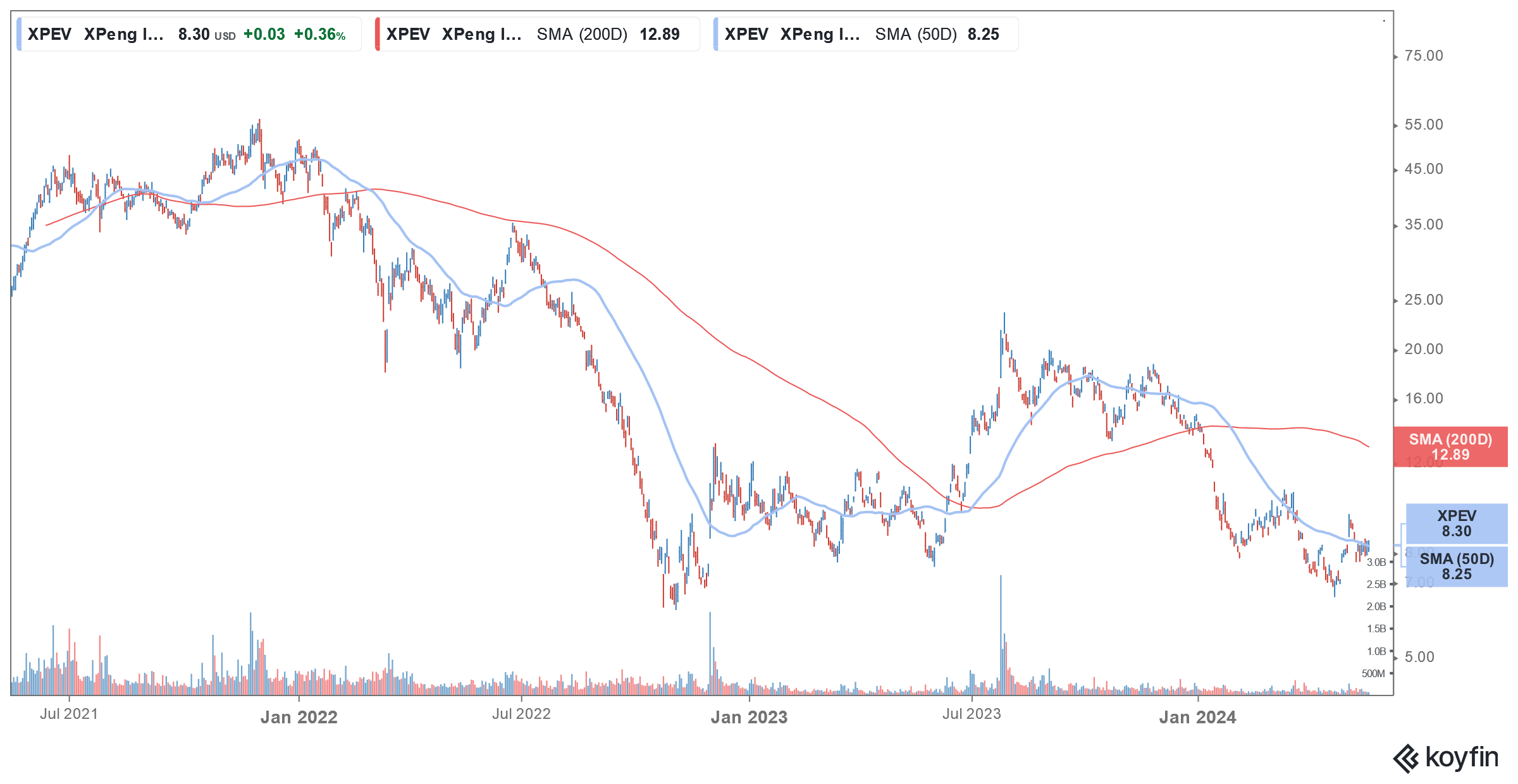Xpeng Motors Aims to Deliver Flying Cars in 2026 Even as EV Deliveries Sag
Please note that we are not authorised to provide any investment advice. The content on this page is for information purposes only.
Chinese electric vehicle (EV) maker Xpeng Motors (NYSE: XPEV) is looking to deliver flying cars in 2026. The company’s core EV business meanwhile has sagged in 2024 and it delivered fewer than 10,000 cars in all four months this year.
Brian Gu, who is the co-president of Xpeng Motors told CNBC that Xpeng AeroHT which is an affiliate of XPEV, would start delivering flying cars to customers in 2026. Notably, flying cars were a hot investment theme a couple of years back. However, amid spiraling losses and tough capital market conditions, the sector fell out with investors.
Table of Contents
Flying Car Companies Have Been Out of Favor With Markets
A lot of startups in the flying car industry went public during the IPO boom of 2020-2021. However, after the initial euphoria, they now trade at a fraction of their listing prices. Even Uber sold its flying taxi unit to Joby Aviation and invested $75 million in the startup.
Gu meanwhile is bullish on the company’s flying car business and said that the company would start accepting pre-orders later this year.
“The reason we are confident, because we are designing this for the use not in urban centers, but for outskirts in scenic areas where … we will work with municipalities to create flying parks and flying zones that allow people to enjoy flying without the hassle of getting all the complicated approvals,” said Gu.
He also dispelled fears that initial passengers would need a special license to fly in these cars. According to him, “Because we are using leisure and sports related use case for the initial use of that flying device. As you move more closer to urban … centers, you do need special licenses and that will be a lot more complicated to get approval for.”
Xpeng Motors has Made Advancements in Autonomous Driving
Earlier this year, Xpeng Motors said that it had rolled out its XNGP driver assistance system to 243 cities a year ahead of schedule and plans to roll out the feature to Europe soon.
It is the first Chinese EV company to offer a mass-produced advanced driver assistance system for both highway and urban driving scenarios
Notably, Xpeng Motors has been advancing its autonomous driving capabilities and in August it also acquired the self-driving assets of Chinese ride-hailing app Didi. As part of the $744 million deal, Didi took a 3.25% stake in Xpeng in exchange for its EV and autonomous driving assets.
The autonomous driving industry in China could however see a shakeup as Tesla has received an approval to launch its full self-driving (FSD) in China.
Xpeng Motors’ EV Deliveries Have Sagged
Meanwhile, looking beyond autonomous driving and flying cars, Xpeng Motors has disappointed investors with its deliveries this year. After delivering over 20,000 cars in December, the company’s 2024 deliveries have been below par.
The company expects deliveries to rise in the coming months as it launches new models. Last year, Volkswagen partnered with Xpeng Motors to build two EVs on its platform and also buy a stake in the company for a total consideration of $700 million. The deal was a pathbreaker for not only XPEV but also the Chinese EV ecosystem as it reflected the confidence of the German auto giant in a startup EV company. It was also a testimony to Xpeng Motor’s self-driving capabilities. The two companies are also exploring joint sourcing in order to cut down on costs.
Chinese EV Companies Face the Heat in Europe
Earlier this week, US President Joe Biden imposed sweeping tariffs on several Chinese goods, including electric cars. The move won’t hurt names like Xpeng Motors for now at least as they don’t yet export to the country.
However, the bigger trouble for Chinese EV companies is the regulatory heat in Europe as the EU is probing Chinese EV companies for the alleged subsidies they receive. Xpeng Motors is meanwhile contemplating producing cars in Europe to blunt any tariffs that the region might impose.
Speaking with reporters on the sidelines of the Beijing autoshow last month, Gu said that currently the company exports a small number of its vehicles but it might reconsider its strategy amid the regulatory issues in Europe
Gu said, “There’s no strategy that’s fixed in stone.” He added, “We have to work around what is required to compete there. Right now, we are making entries into markets with our products produced in China.”
Chinese EV Companies Are Quite Competitive
While Chinese EV companies are allegedly able to sell cars at low prices due to the alleged subsidies, some others believe that they are simply more efficient than automakers in other countries. On multiple occasions, Tesla’s CEO Elon Musk has praised China’s manufacturing ecosystem and EV companies. Earlier this year during Tesla’s Q4 2023 earnings call, he said, “Frankly, I think if there are not trade barriers established, they will pretty much demolish most other companies in the world.”
In May last year, Musk termed China-based EV maker BYD “highly competitive.” In 2011, the billionaire had laughed at the possibility of BYD as a competitor to Tesla.
Coming back to Xpeng Motors, the company will release its Q1 earnings next week where it might provide insights into its delivery outlook for 2024 after a somber start to the year.






